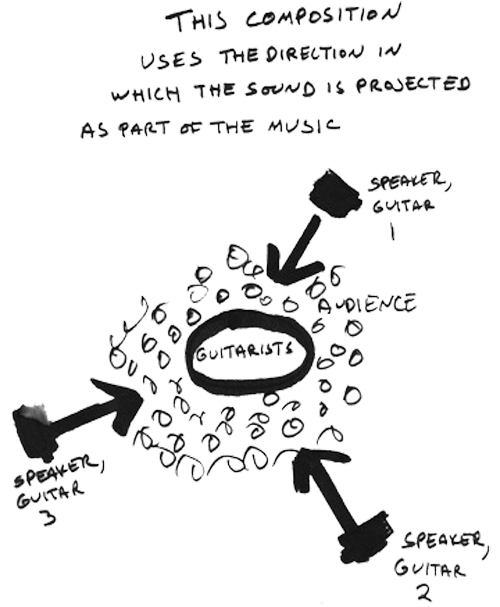is a composition for 3
electric guitars
that
incorporates spatial
projection,
location
&
movement
as part
of its design.
3 separate
guitar amplifiers,
positioned
around the perimeter of
a
listening environment,
project
sounds that
move
around
its
listeners.
This
is
combination
sound installation,
fixed
composed
piece
&
improvising
platform.
![]()
concept — sound samples — notation
As with many other sound installations, a sonically generated architectural event constructs an aural environment through which listeners themselves may move. Sound location’s integral role in this music’s coordination addresses sculptural concerns with space and movement; and certain episodes project a repetition derived stasis that can evoke the relative stability presented by so many objects of visual art.
triangle bounce departs from most sound installation practice in that its sounds are generated through the live intervention of actual musicians rather than mechanically.
As with much concert music, the sounds of triangle bounce are constructed from a single strand of thematic material, which is, in this case, displayed in an arc form (an approach highly favored by Bartok) and expanded into 7 distinct movements (A-B-C-D-C-B-A), where each unfolds a distinctly contrasting soundscape The overlapping, mirrored repetitions of European canonic writing are here frequently synthesized with the polyrhythmic ethos of Pan-African musics; and both of these stretch across the sculptural movement dynamics of expanded spatial location.
This is music 3D.
While the music of triangle bounce is designed to be able to hold its own in a conventional concert hall setting as a set piece, several movements also allow for episodes of interactive, live composing (a.k.a. improvisation) on the part of its guitarists, in this way reaffirming this music’s fundamentally vernacular roots. The distinctive compositional personality of each guitarist is intended to shine through and further diversify the multiple layers of this event.
The guitar itself easily shines as the world’s most popular musical instrument of the last half a century (after the drum and the voice). It can represent nearly any vocabulary and can accommodate nearly anybody, from beginner to virtuoso. triangle bounce celebrates some of the seemingly endless potential of this wonderful, marvelous, ever so adaptable, people’s instrument though coordinating an unusual instance of tight, demanding (to play) ensemble music that’s composed just for guitars alone,
The triangle bounce project opens to a number of possible audiences, which is to say it carries a degree of “crossover” potential. This music and presentation could engage a “classical/new music” audience or a “jazz/improvised music” audience with equal success. It could find a place in the visual arts / museum world in its capacity as sound installation. It could appeal to listeners who enjoy reaching “beyond genre” as well. And let’s not forget the guitar world. In this way, the project shows a capacity to slip beyond the perceived limits of any single category toward a wider and more diverse audience.